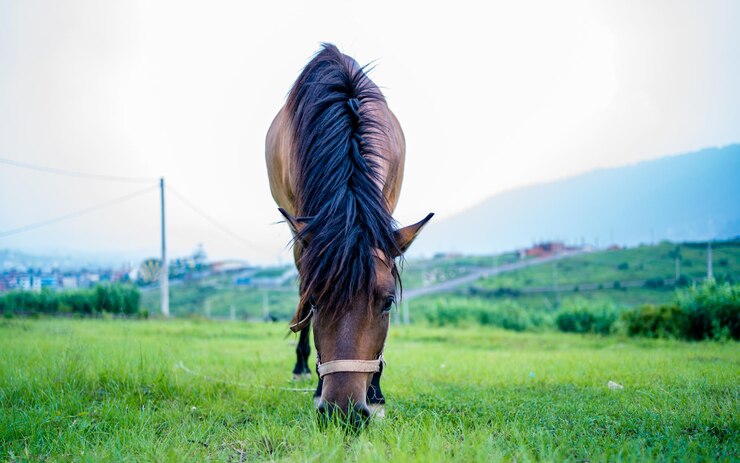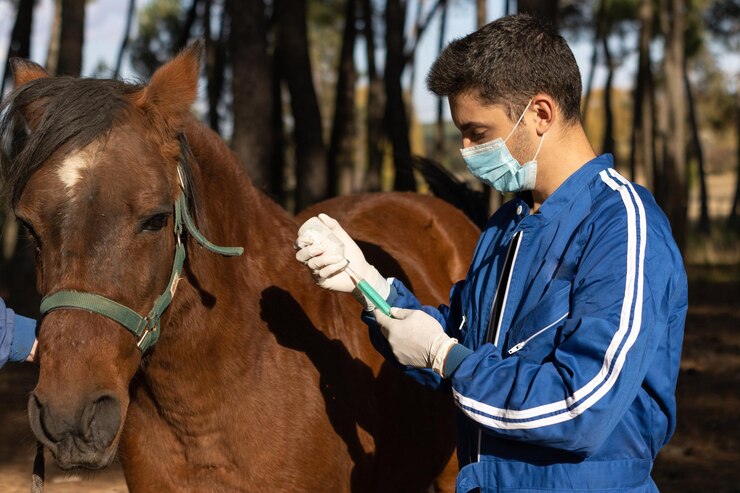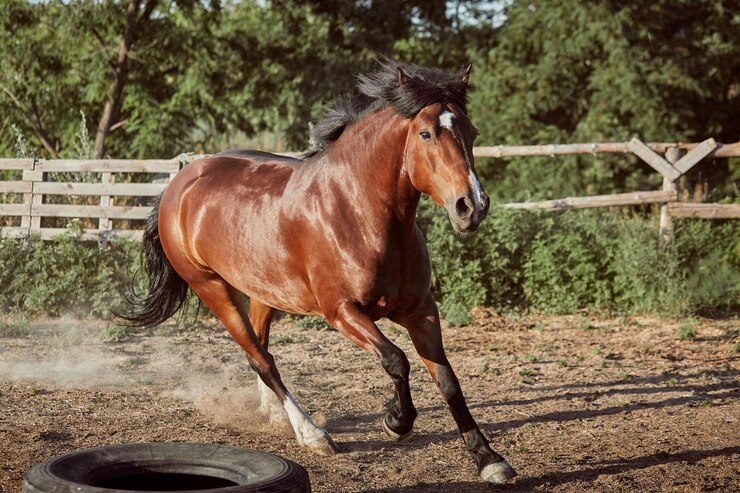One big reason why horses might have back pain is because of overriding (or impinging) dorsal spinous processes” or “spinous process impingement”, also called "Kissing Spines.” It is a condition where certain parts of the horse's spine overlap or touch each other, causing discomfort and problems with how the horse behaves and performs.
Equine caretakers or owners, like riders and vets, are seriously concerned about this issue. Even though we know it happens a lot and can be painful, the question is— Why do horses get Kissing Spines, and is there a way to stop it from happening to your equine friend?
What Exactly Is Kissing Spines?
Your horse's spine is made up of a long chain of 54 pieces of bones known as vertebrae. The upper part, called the back, has 18 thoracic and 6 lumbar vertebrae. In a healthy horse, these bones and the spinous processes (the bony projections off the top of the vertebrae) are spaced out evenly which allows the back to move smoothly.
However, if a horse is suffering from Kissing Spines, two or more of these bony projections will be too close, touch, or even overlap each other. This causes the bones to rub against one another, which is extremely hurtful. The lack of space between the bones makes it hard for your equine buddy to move its back causing immense pain and discomfort.

Causes of Kissing Spine
Even though the exact reason for Kissing Spine is still unknown, it is believed that some horses may be genetically predisposed.
The following are a few causes of Kissing Spines in horses—
- Poor structure of the horse’s back
- Excessive or incorrect training and exercising
- Ill-fitting tack, particularly saddles
- Insufficient core strength
- Trauma to the back
- Arthritis or other joint issues in the spine
- Poor nutrition and inadequate levels of calcium and vitamin D
It's important to note that not all horses with these factors will develop a Kissing Spine. However, these are potential risk factors that can contribute to the development of this condition.
How Can I Tell If My Horse Has Kissing spines?
Identifying Kissing Spines early can reduce its effects on your horse's health and performance. However, symptoms can range from subtle changes in behavior to more visible signs of discomfort.
Here are some of the indicators to look out for—
- Showing discomfort during saddling or grooming
- Resistance to certain movements, such as collection or extension
- Back pain upon palpation
- Unexplained behavioral changes, including aggression or reluctance to work
- Difficulty in maintaining a consistent performance level
- Bucking or rearing under saddle
- Muscle spasms or atrophy along the back
- Uneven gait or lameness

Diagnosing Kissing Spines in Horses
When your horse shows signs that could be linked to Kissing Spines, it is crucial to figure out if they really have it and then start the right treatment. X-rays are most commonly used when evaluating a horse for kissing spines. Other tests like bone scans, thermography, and ultrasound can also provide helpful information to plan the right treatment. Your veterinarian will use their findings to grade the severity of a horse’s kissing spines on a scale of 1 to 4. A grade 1 diagnosis indicates only a narrowing of the interspinous space(s) whereas a grade 4 case would involve severe remodeling of the spinous processes.
Treatment Options
To treat Kissing Spines, the first step is to make your equine companion more comfortable. Your vet might suggest supplements, muscle relaxants, local corticosteroid injections, chiropractic therapy or other holistic treatments to help minimize inflammation.
Following are a few treatment options usually recommended when your horse is dealing with such a condition—
Rest and Medication
The vet might give your horse an anti-inflammatory medicine and suggest some rest to help calm down inflammation in the spine. Remember, this might only work for less serious cases of Kissing Spines.
Injections
Your vet might give a shot of Corticosteroid in the affected area to help ease pain and lower inflammation. However, this solution is temporary, and your horse might need to go through this again from time to time.
Surgery
In more severe cases, the veterinary professional might suggest surgery to remove or alter the bony parts causing issues. While the recovery time may be longer, it might provide lasting relief and improved performance.
Physiotherapy
It consists of specially designed exercises for your equine companion that can help stretch and strengthen its back muscles. This can be particularly beneficial for cases of Kissing Spine caused by poor core strength or incorrect training.
Shockwave Therapy
Non-invasive shockwave sessions can boost blood flow and accelerate healing in the affected areas of your equine friend. This treatment option may also give you positive results in reducing symptoms and improving performance.
A few other methods to control pain and discomfort may include—
- Acupuncture
- Therapeutic ultrasound
- Chiropractic (veterinary medical manipulation)
- Non-steroidal anti-inflammatory drugs or supplements (NSAIDs)
- Muscle relaxants
Remember, each horse is unique, and what works best can vary. Therefore, depending on your horse’s condition your vet might choose one or more of these treatment options.
Preventive Measures to Protect Your Horse from Kissing Spines
- Regular veterinary check-ups
- Proper riding techniques
- A balanced exercise routine
- Regular farrier care
- Adequate turnout
- Proper training
- A well-balanced diet
Keep Your Horse Healthy with MVP
Kissing Spines in horses can lead to serious problems affecting their well-being, comfort, and performance. We, at Med Vet Pharmaceuticals, understand how important it is to diagnose the symptoms and be proactive in seeking medical help.
With proper care, management, and treatment, horses diagnosed with Kissing Spines can continue to lead healthy and productive lives.
Hurry! Contact us now to ensure the longevity, health, and happiness of your equine companion.


